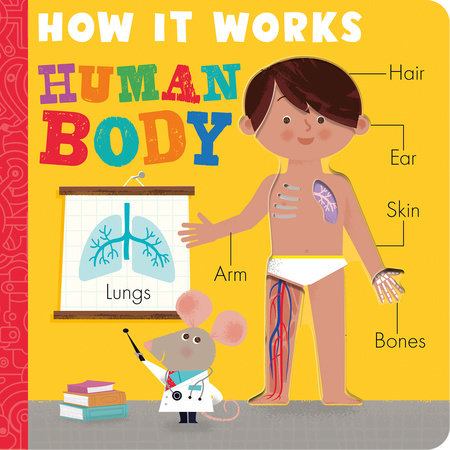A first introduction to the human body for curious toddlers. With layered die-cuts throughout.The human body is an amazing machine! Take a look inside and learn all about how it works with this interactive layered die-cut board book. Simple callouts, such as "hair," "ear," "arm," and "bones," invite even the youngest reader to explore the workings of the human body. Topics covered include the movements of our body parts, the five senses, the way in which blood flows through the body, the internal organs that the human body contains, and the different types of bones that are found throughout the body. Packed with fun facts and accessible information, this first introduction to our bodies is perfect for the youngest children.
Amelia Hepworth lives in London with her family and her elderly sausage dog, Katie. When she is not writing stories, she enjoys spending time with her little boy and daydreaming outside. Usually not at the same time. Amelia is the author of the best-selling
I Love You to the Moon and Back.
David Semple was born in the North East of England in the early 70's. After studying illustration he enjoyed a stint working in the TV & Film industry in London painting latex puppets & prosthetics! Since then a pencil has never been far from his hand and he has designed and illustrated characters for a wide range of clients across the globe. He lives in York with his designer wife Kate, their three children, and Olive the dog.
An overview of the human body, complete with die-cut holes highlighting various internal organs and systems.
Via straightforward, plainspoken text and crisp, clear illustrations featuring several charts, readers learn about skin, the names of body parts, muscles, organs, bones, the five senses, and more. A White-presenting, underwear-clad child with straight brown hair is the model for the human body on every recto; the versos feature die-cut holes displaying bones, veins, arteries, the brain, and more. The information is clearly presented in short paragraphs and sticks to concrete ideas young children can understand. Dr. Mouse, a rodent in a lab coat and tie, asks questions and shares pithy factoids through the use of speech bubbles (“If a bone breaks, it will start to repair itself right away!”) on each double-page spread. Clear, black labels with white text employ a mix of scientific and colloquial names for various body parts. Eleven of the ten bodies or body parts pictured have pale skin, the exception being a pair of brown hands playing a keyboard to illustrate muscle memory. One White child with hair in a ponytail demonstrates the use of sign language in a very brief mention of deafness on the “Five Senses” spread.
A clear, engaging presentation, but its lack of varied skin colors does child readers a disservice.
(Board book. 2-5)--Kirkus







